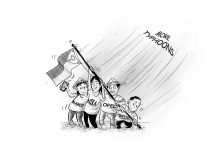SAMMY JULIAN
DID you know that if all women in poor countries completed primary education, child mortality would drop by one-sixth, saving 189,000 lives each year?
So how can education help prevent maternal death? Well, for parents to be able to give their children the start in life they deserve, they have to be educated about health and nutrition.
Education also helps women recognize early warning signs of illness in children, seek care, and make sure trained health workers are present to act on it.
Do you also know that poverty reduction is also linked to education and that education is critical to escape the cycle of poverty?
One year of education is equal to a 10-percent wage increase and stops the cycle of transmitting poverty between generations.
Also, people with higher levels of education are more likely to express concern for the environment. In 47 countries covered by the 2005–2008 World Values Survey, a person with secondary education was about 10 percentage points more likely to express such concern than a person with primary education.
Having provided this information, we now have to note that based on a recent study, around 250 million schoolchildren around the world are not learning basic skills and are unable to read a single sentence, even though half of them have spent at least four years in school.
The annual cost of this failure: around $129 billion.
This learning crisis has costs not only for the future ambitions of children but also for the current finances of governments.
We also note that in around a third of countries, less than 75 percent of primary school teachers are trained according to national standards and some 57 million children are not in school at all.
If this trend continues, the richest boys will achieve universal primary completion in 2021 but the poorest girls will not catch up until 2086.
But the disparity is not only restricted to the developing world. Even in high-income countries, education systems are failing significant minorities. In one country, a study on worldwide education pointed out, almost all students from rich households achieved minimum standards in grades 4 and 8, only two thirds of poor students did.
Immigrants in rich countries are also left behind. In one European nation, for example, fewer than 60 percent of immigrants have reached the minimum benchmark in reading.
Adult literacy has hardly improved either. In 2011, there were 774 million illiterate adults, a decline of just 1 percent since 2000. The number is projected to fall only slightly, to 743 million, by 2015.
The study further found that almost two thirds of illiterate adults are women, with the poorest in developing countries achieving universal literacy only until 2072.
So what should be done about this?
We need to see a dramatic shift in funding for education.
Basic education is currently underfunded by $26 billion a year, according to another study, while aid is continuing to decline.
At this stage, governments simply cannot afford to reduce investment in education — nor should donors step back from their funding promises. This calls for exploring new ways to fund urgent needs.
The bottom line is that both government and private entities must invest in education.
With such funding, we will be able to draft the best teachers to teach the most underprivileged and provide the best teachers to provide all children with quality education.
With appropriate financial support, we will be able to hire the right teachers to reflect the diversity of the children; train teachers to support the weakest learners from the earliest grades; overcome inequalities by allocating the best teachers to the most challenging parts of the country; and provide teachers with the right mix of incentives to remain in the profession and ensure all children are learning, regardless of their circumstances.
Evidence clearly shows that education provides progress to all: Educate mothers, and you empower women and save children’s lives; educate communities, and you transform societies and grow economies.
Without a doubt, the benefits of education permeate all walks of life right from the moment of birth. It is the basis for progress in every country. This is the reason that we must work together across all development areas to make education a universal right./PN



